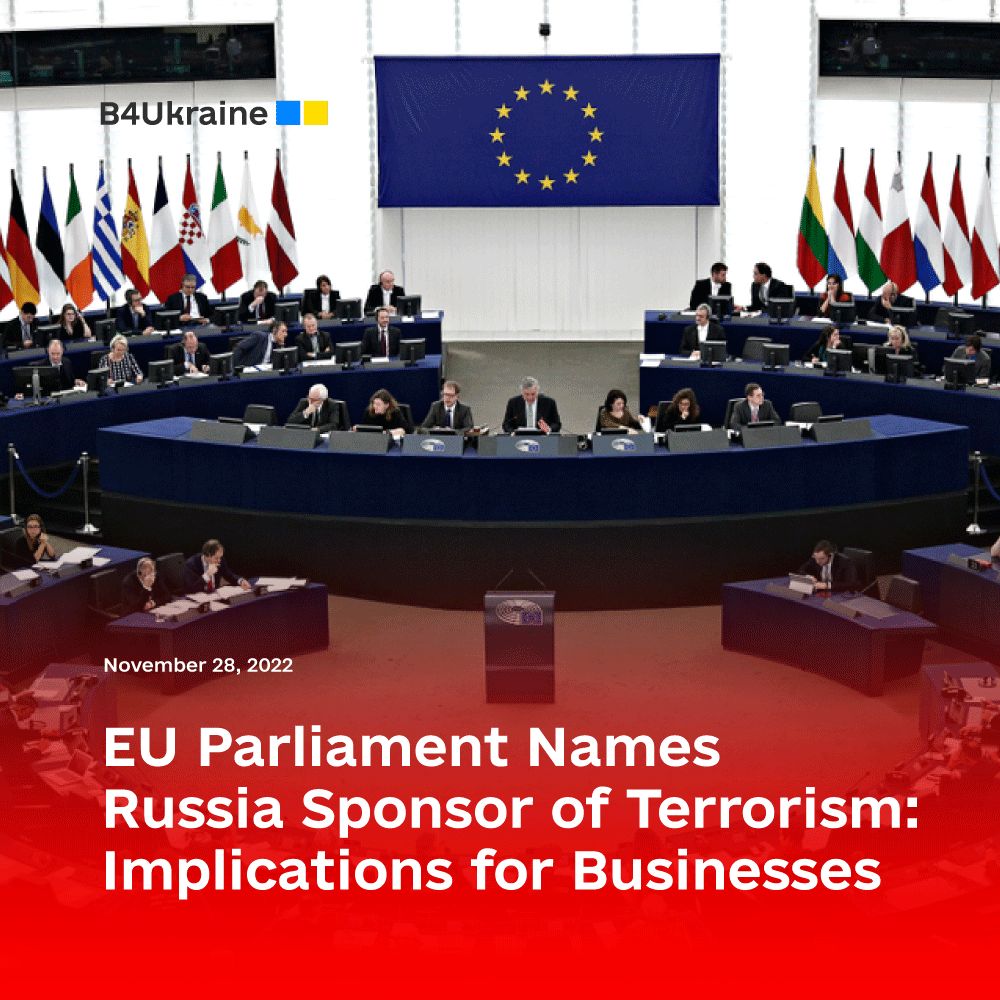
On November 23, the European Parliament adopted a historic resolution recognizing Russia as a state sponsor of terrorism and a state that uses means of terrorism.
“The deliberate attacks and atrocities committed by Russian forces and their proxies against civilians in Ukraine, the destruction of civilian infrastructure and other serious violations of international and humanitarian law amount to acts of terror and constitute war crimes,” the Parliament stated.
The next step for the EU Commission and the EU Parliament is to issue an advisory for the home companies on what the expected behavior is when you make a profit in a terrorist state, says member of B4Ukraine Steering Committee Dr. Eka Iakobishvili. “After the move reputational risks associated with continued operations in Russia have been brought to a new height. The political implications of the resolution may later lead to legally binding decisions. EU companies must end all operations and business relationships in Russia or risk being complicit in its crimes”.
As the EU currently has no centralized list of state sponsors of terrorism and no equivalent mechanism, the designation entails no immediate legal consequences. However, it is an important political step that will define the relationship between the EU and Russia for years to come, and the one that should shape corporate behavior in relation to the states that attack international rules-based order, explains Iakobishvili.
The European Parliament has limited influence in foreign policy decision-making and therefore called on the EU and its member states to put in place the proper legal framework and consider adding Russia to such a list.
MEPs hope this would trigger a number of significant restrictive measures against Moscow and have profound restrictive implications for EU relations with Russia.
Some EU states like Estonia, Latvia, Lithuania, Czechia, Poland, and the Netherlands have already added Russia to the national lists of terrorist states. The Baltic states have used the listing to justify the freezing of EU visas for Russian citizens, while Lithuanian lawmakers are reportedly considering further measures to ban companies from doing business with Russia or Russians. The Dutch legislation does not provide any sanctions for those who have been declared sponsors of terrorism. The Czech and Polish moves also have more of a political dimension, says Iakobishvili. They call to establish an international tribunal for Russia’s crime of aggression, ask the EU institutions to provide Ukraine additional support, and tighten the sanctions against Russia.
The US has so far held back from listing Russia as a terrorist state for its actions in Ukraine even though both chambers of the US Congress urged secretary of state Anthony Blinken to do so.
The potential U.S. designation would make it illegal for American individuals and legal entities to participate in financial transactions with the Russian government, Russian state-owned banks and enterprises, and persons connected with the Russian government.
It would also introduce secondary sanctions against any entities in the world that are connected, for example, by transactions with Russia and its institutions.
The EU parliament resolution calls on the EU countries to end all cooperation with Russia, to complete work on the ninth EU sanctions package, and to consider possible measures against countries trying to help Russia circumvent restrictive measures already put in place.
B4Ukraine coalition shares the stance and calls on EU member states to declare Russia and Putin’s regime a terrorist state. International companies must stop creating jobs and value add in Russia to ensure that Moscow has no resources to continue its war of aggression against Ukraine and the entire free world.